How to uninstall AutoClicker from computers
Potentially unwanted applicationAlso Known As: AutoClicker questionable application
Get free scan and check if your device is infected.
Remove it nowTo use full-featured product, you have to purchase a license for Combo Cleaner. Seven days free trial available. Combo Cleaner is owned and operated by RCS LT, the parent company of PCRisk.com.
What is AutoClicker?
AutoClicker is an application created to automate the clicking of a mouse on a computer screen element. However, we found that it is distributed through torrents and similar channels, and its installer (and the app itself) is flagged as malicious by multiple security vendors. Thus, it is advisable to avoid installing AutoClicker on computers.
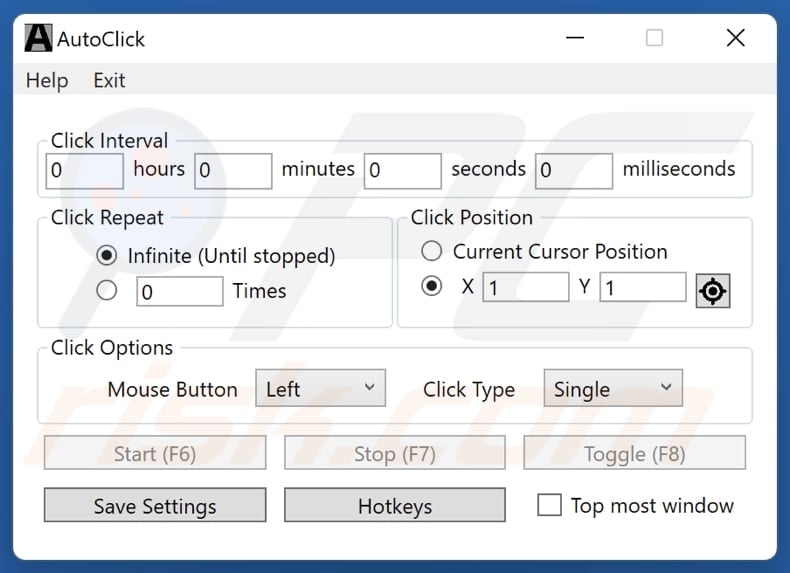
More about apps like AutoClicker
Apps like AutoClicker are often classified as unwanted applications. They tend to be ad-supported, meaning they bombard users with intrusive ads, pop-ups, or other content. These ads can take users to unreliable websites or cause unwanted downloads. This can be annoying and increase the risk of accidentally clicking on malicious links that lead to infections, scams, or other threats.
Also, apps of this kind may trick users into subscribing to services or making purchases. This could lead to unexpected charges or financial losses. These apps may also gather various information, including browsing habits or even sensitive information. In such cases, their developers may misuse the obtained data for malicious purposes.
Furthermore, unwanted apps can slow down devices by consuming system resources and hijack web browsers. Browser hijacking usually involves changing the settings of a web browser and preventing users from undoing these changes. It is common for browser hijackers to promote fake search engines or other unreliable websites.
For these reasons, it is advisable to avoid unwanted applications, including AutoClicker. If an app of this kind is already installed, it should be eliminated as soon as possible. Sometimes, these apps are persistent, and their removal without specialized tools is difficult.
| Name | AutoClicker questionable application |
| Threat Type | Unwanted application |
| Supposed Functionality | Automated clicker |
| Detection Names (Installer) | Bkav Pro (W32.AIDetectMalware), K7AntiVirus (Riskware ( 00584baa1 )), K7GW (Riskware ( 00584baa1 )), Full List Of Detections (VirusTotal) |
| Detection Names (Application) | Huorong (HEUR:VirTool/MSIL.Obfuscator.gen!BA), Rising (Trojan.AntiVM!1.CF63 (CLASSIC)), Full List Of Detections (VirusTotal) |
| Symptoms | A program that you do not recall installing suddenly appeared on your computer. A new application is performing computer scans and displays warning messages about 'found issues'. Asks for payment to eliminate the supposedly found errors. |
| Distribution Methods | Torrent websites, deceptive pop-up ads, free software installers (bundling) |
| Damage | Monetary loss (unnecessary purchase of fake software), unwanted warning pop-ups, slow computer performance. |
| Malware Removal (Windows) |
To eliminate possible malware infections, scan your computer with legitimate antivirus software. Our security researchers recommend using Combo Cleaner. Download Combo CleanerTo use full-featured product, you have to purchase a license for Combo Cleaner. 7 days free trial available. Combo Cleaner is owned and operated by RCS LT, the parent company of PCRisk.com. |
Conclusion
In conclusion, unwanted applications pose various risks, from data theft to system damage. It's always best to install apps only from trusted sources, read reviews, and keep your software up-to-date to minimize potential dangers. More examples of apps classified as unwanted are Oovi Appc, Dzentime, and FlipPlayer.
How did unwanted applications install on my computer?
AutoClicker is distributed through torrent sites, meaning it may be disguised as another app, and users may download and install it unintentionally. It is also possible that AutoClicker is distributed via misleading advertisements, P2P networks, third-party downloaders, fake software updates, and similar channels.
Another popular distribution method used to trick users into installing unwanted apps is bundling. Users agree to install such apps during installations of free and (or) unreliable software by leaving unwanted offers pre-selected or certain options/settings unchanged.
How to avoid installation of unwanted applications?
Always download apps from reputable sources like official app stores (Google Play, Apple App Store) or websites. Avoid downloading from third-party app stores or downloaders, shady sites, P2P networks, etc. Before downloading an app, check its reviews and ratings. Be cautious of pop-up ads or links on questionable websites.
When installing apps, check for unwanted offers and deselect them. Install reputable antivirus or anti-malware software and perform regular system scans. Do not allow suspicious websites to send notifications. Periodically check the apps installed on your device and remove any that you do not use or recognize.
If your computer is already infected with rogue apps, we recommend running a scan with Combo Cleaner Antivirus for Windows to automatically eliminate them.
Website used to distribute AutoClicker:

Installation setup of AutoClicker application:
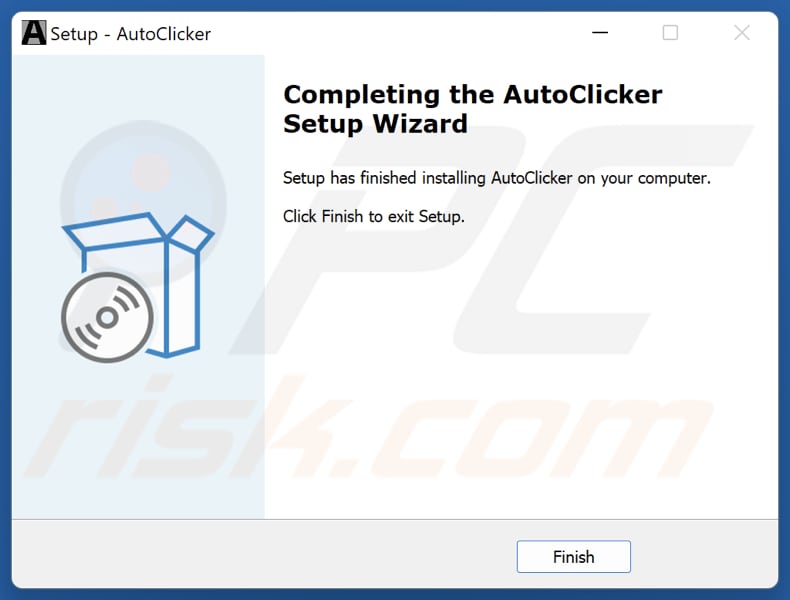
Installation folder:
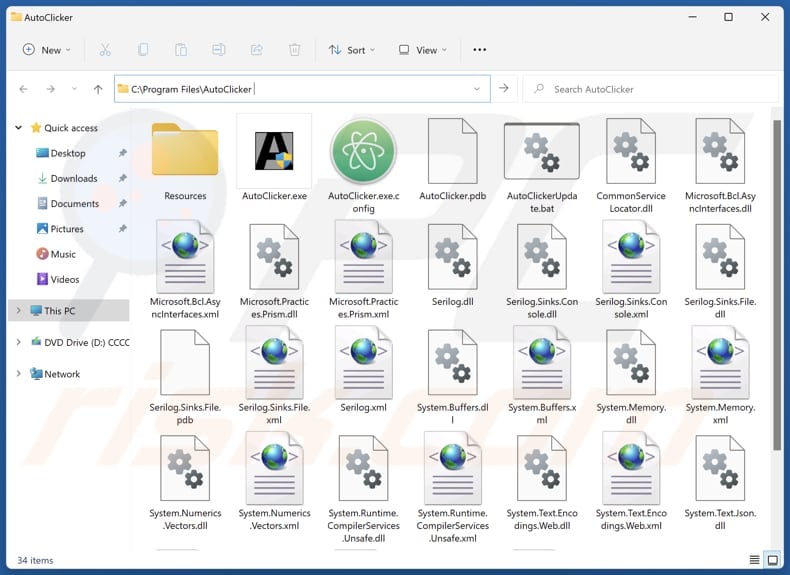
Instant automatic malware removal:
Manual threat removal might be a lengthy and complicated process that requires advanced IT skills. Combo Cleaner is a professional automatic malware removal tool that is recommended to get rid of malware. Download it by clicking the button below:
DOWNLOAD Combo CleanerBy downloading any software listed on this website you agree to our Privacy Policy and Terms of Use. To use full-featured product, you have to purchase a license for Combo Cleaner. 7 days free trial available. Combo Cleaner is owned and operated by RCS LT, the parent company of PCRisk.com.
Quick menu:
- What is AutoClicker?
- STEP 1. Uninstall deceptive applications using Control Panel.
- STEP 2. Remove rogue extensions from Google Chrome.
- STEP 3. Remove potentially unwanted plug-ins from Mozilla Firefox.
- STEP 4. Remove rogue extensions from Safari.
- STEP 5. Remove rogue plug-ins from Microsoft Edge.
Removal of unwanted applications:
Windows 11 users:
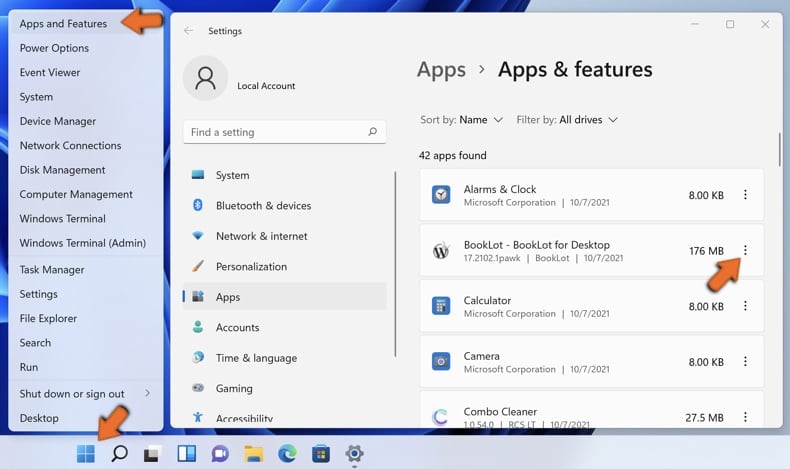
Right-click on the Start icon, select Apps and Features. In the opened window search for the application you want to uninstall, after locating it, click on the three vertical dots and select Uninstall.
Windows 10 users:
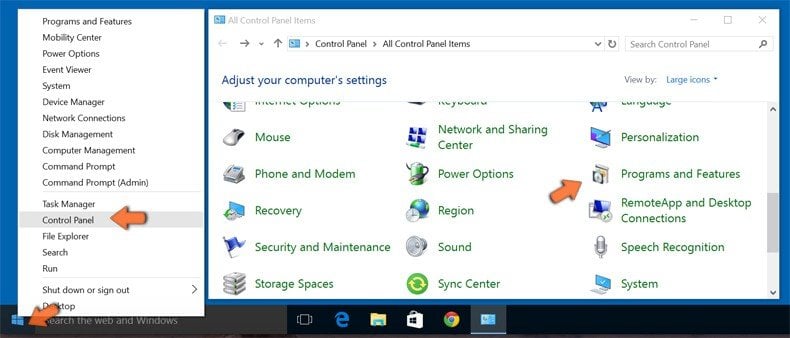
Right-click in the lower left corner of the screen, in the Quick Access Menu select Control Panel. In the opened window choose Programs and Features.
Windows 7 users:
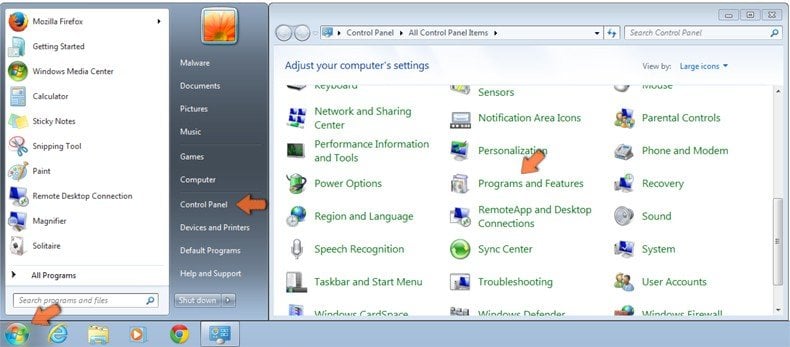
Click Start (Windows Logo at the bottom left corner of your desktop), choose Control Panel. Locate Programs and click Uninstall a program.
macOS (OSX) users:
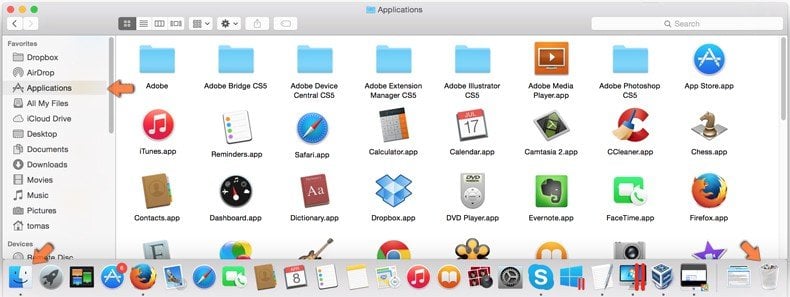
Click Finder, in the opened screen select Applications. Drag the app from the Applications folder to the Trash (located in your Dock), then right click the Trash icon and select Empty Trash.
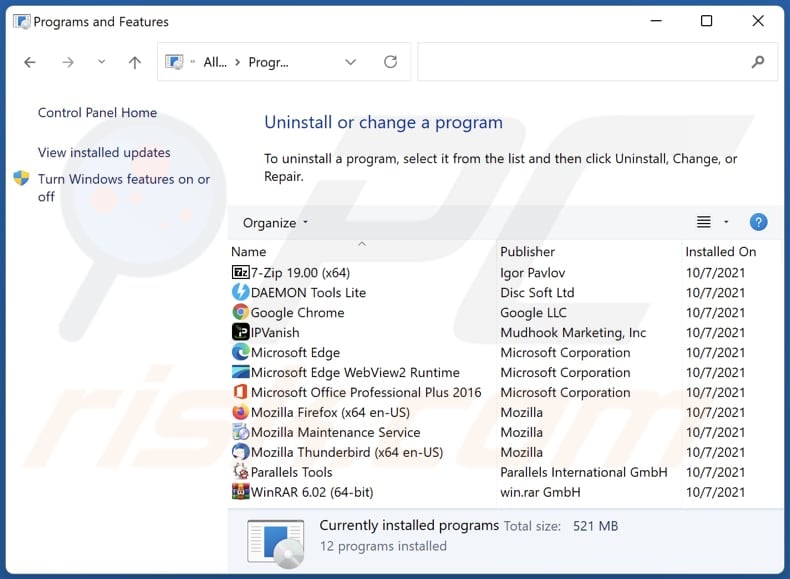
In the uninstall programs window, look for suspicious applications, select these entries and click "Uninstall" or "Remove".
After uninstalling the potentially unwanted application, scan your computer for any remaining unwanted components or possible malware infections. To scan your computer, use recommended malware removal software.
DOWNLOAD remover for malware infections
Combo Cleaner checks if your computer is infected with malware. To use full-featured product, you have to purchase a license for Combo Cleaner. 7 days free trial available. Combo Cleaner is owned and operated by RCS LT, the parent company of PCRisk.com.
Remove rogue extensions from Internet browsers:
At time of research, AutoClicker did not install any unwanted browser extensions, however, some unwanted applications can be installed together with adware and browser hijackers. If you experience unwanted ads or redirects when browsing the Internet, continue with the removal guide below.
Video showing how to remove potentially unwanted browser add-ons:
 Remove malicious extensions from Google Chrome:
Remove malicious extensions from Google Chrome:
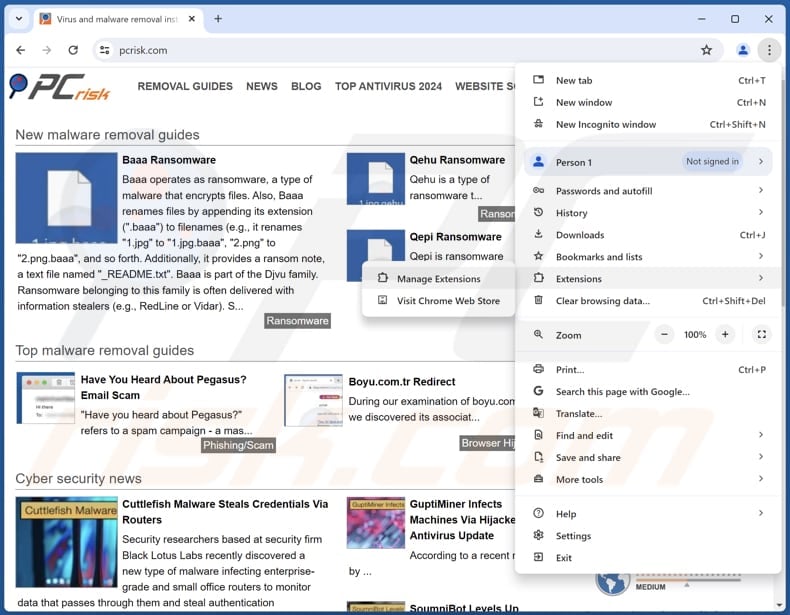
Click the Chrome menu icon ![]() (at the top right corner of Google Chrome), select "Extensions" and click "Manage Extensions". Locate all recently-installed suspicious extensions, select these entries and click "Remove".
(at the top right corner of Google Chrome), select "Extensions" and click "Manage Extensions". Locate all recently-installed suspicious extensions, select these entries and click "Remove".
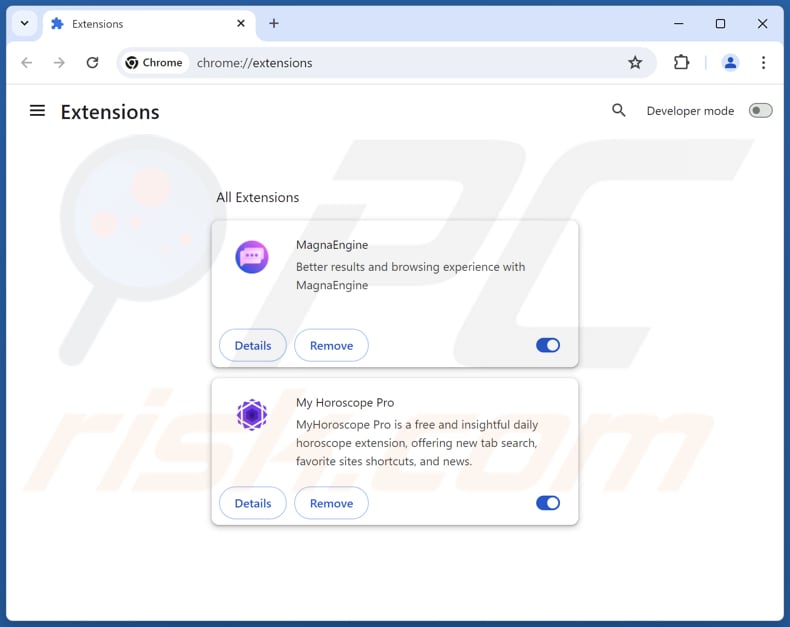
Optional method:
If you continue to have problems with removal of the autoclicker questionable application, reset your Google Chrome browser settings. Click the Chrome menu icon ![]() (at the top right corner of Google Chrome) and select Settings. Scroll down to the bottom of the screen. Click the Advanced… link.
(at the top right corner of Google Chrome) and select Settings. Scroll down to the bottom of the screen. Click the Advanced… link.
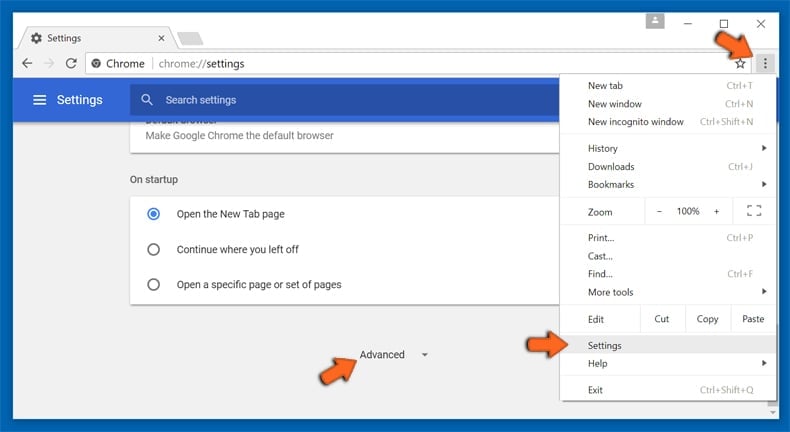
After scrolling to the bottom of the screen, click the Reset (Restore settings to their original defaults) button.
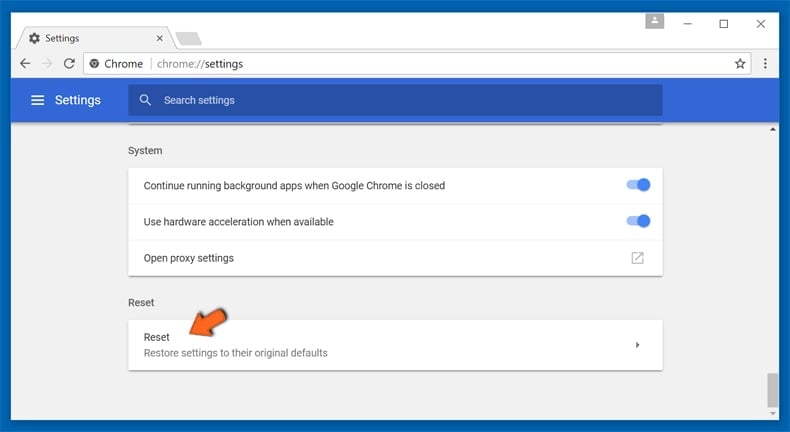
In the opened window, confirm that you wish to reset Google Chrome settings to default by clicking the Reset button.
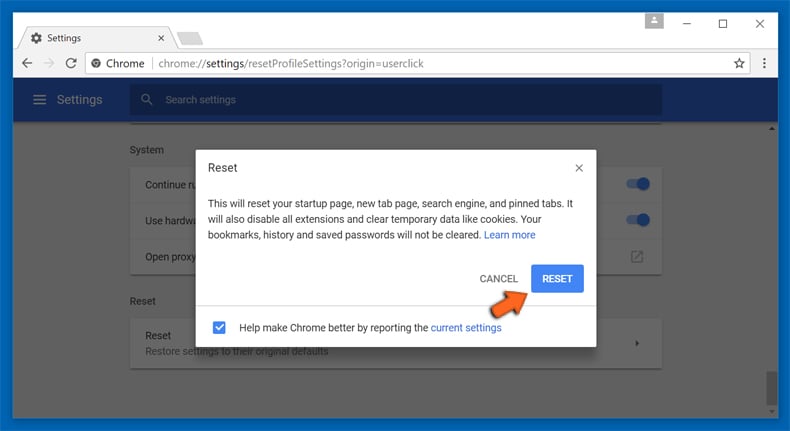
 Remove malicious plugins from Mozilla Firefox:
Remove malicious plugins from Mozilla Firefox:
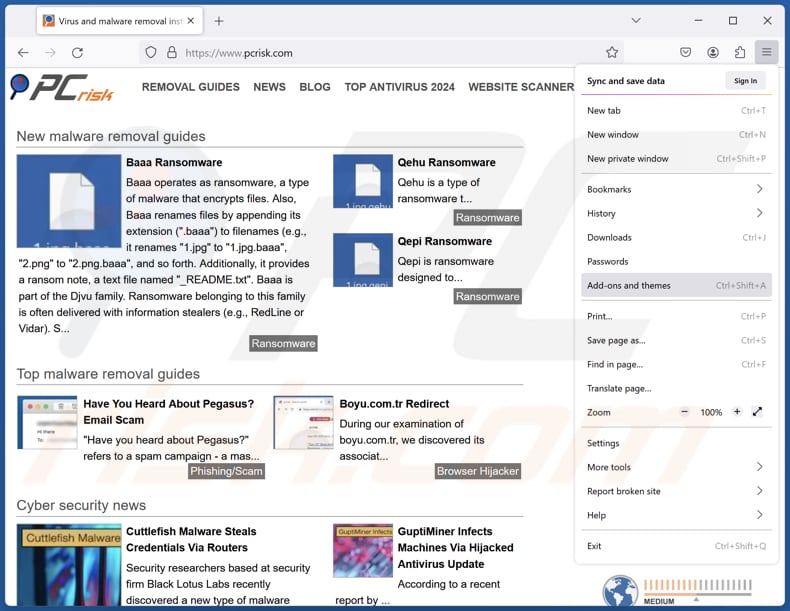
Click the Firefox menu ![]() (at the top right corner of the main window), select "Add-ons and themes". Click "Extensions", in the opened window locate all recently-installed suspicious extensions, click on the three dots and then click "Remove".
(at the top right corner of the main window), select "Add-ons and themes". Click "Extensions", in the opened window locate all recently-installed suspicious extensions, click on the three dots and then click "Remove".
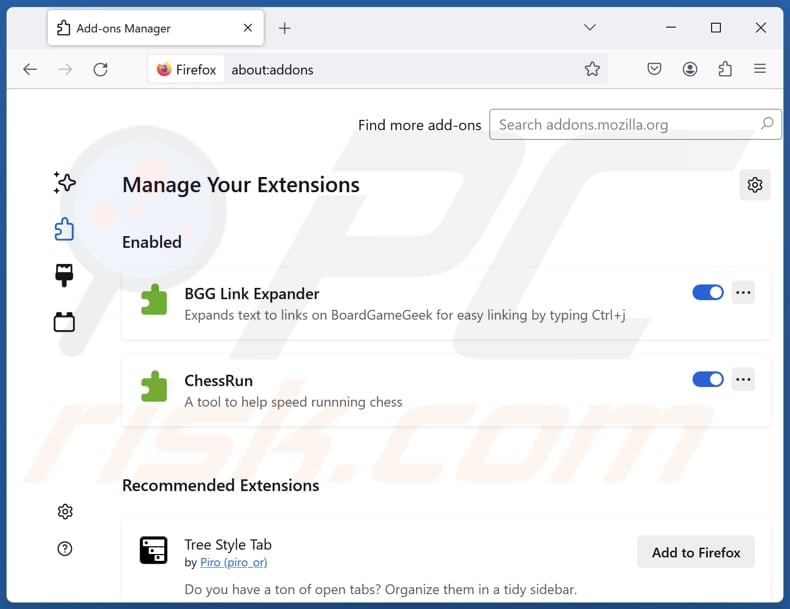
Optional method:
Computer users who have problems with autoclicker questionable application removal can reset their Mozilla Firefox settings.
Open Mozilla Firefox, at the top right corner of the main window, click the Firefox menu, ![]() in the opened menu, click Help.
in the opened menu, click Help.
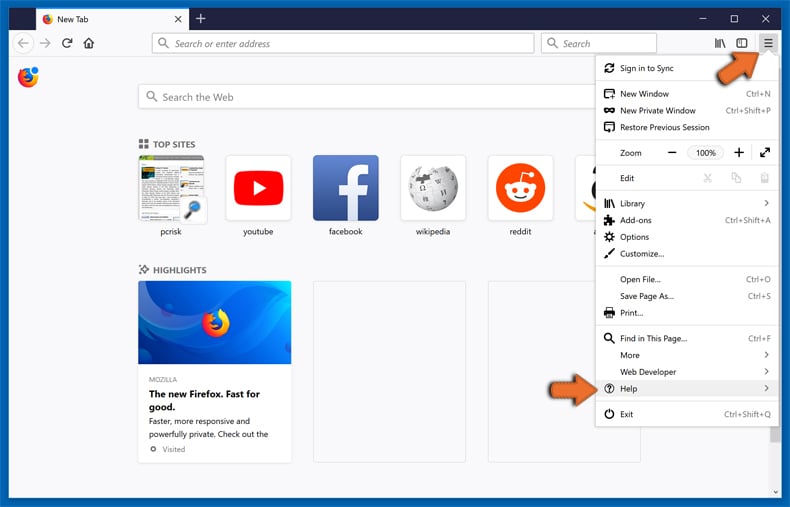
Select Troubleshooting Information.
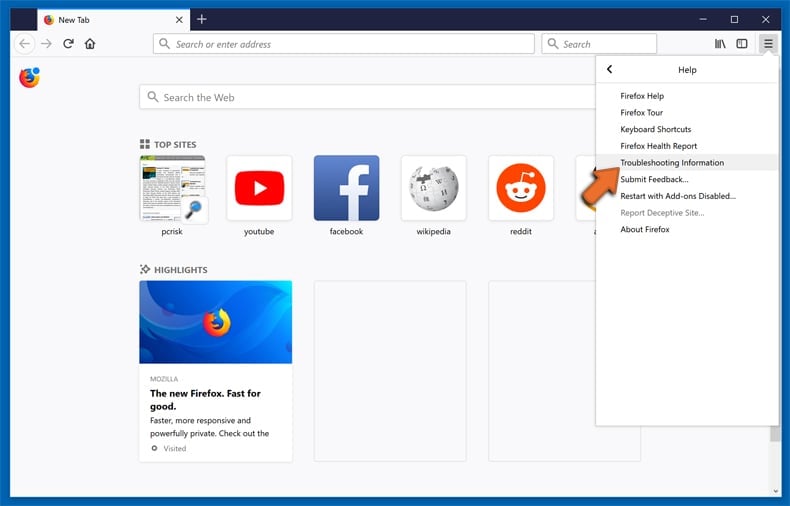
In the opened window, click the Refresh Firefox button.
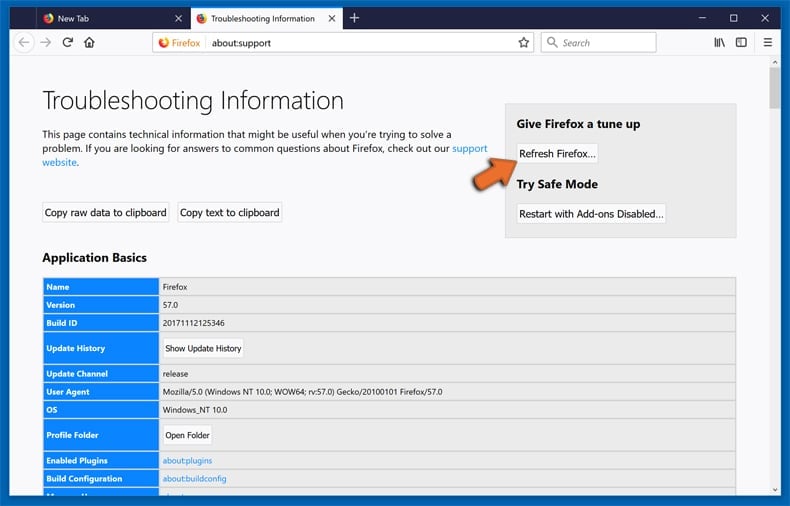
In the opened window, confirm that you wish to reset Mozilla Firefox settings to default by clicking the Refresh Firefox button.
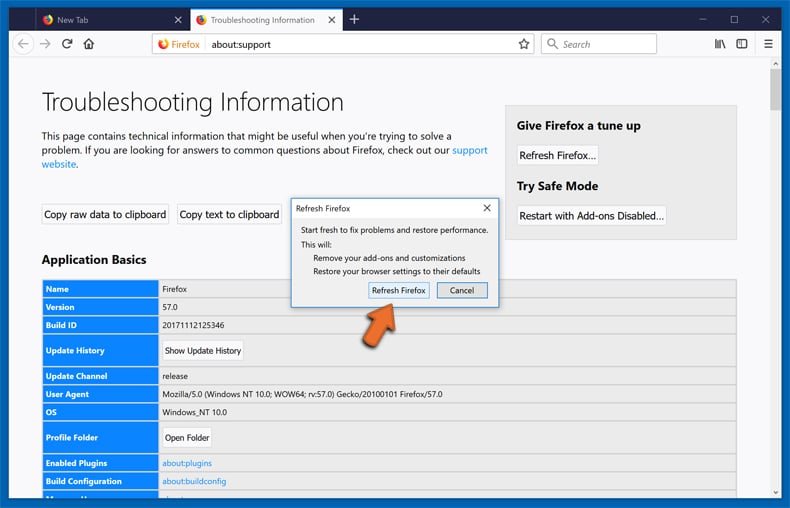
 Remove malicious extensions from Safari:
Remove malicious extensions from Safari:
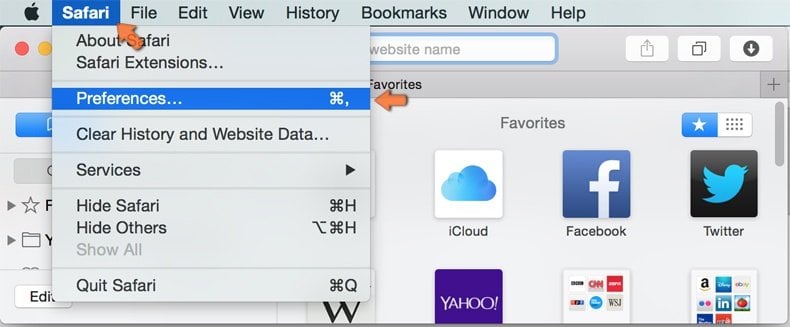
Make sure your Safari browser is active, click Safari menu, and select Preferences....
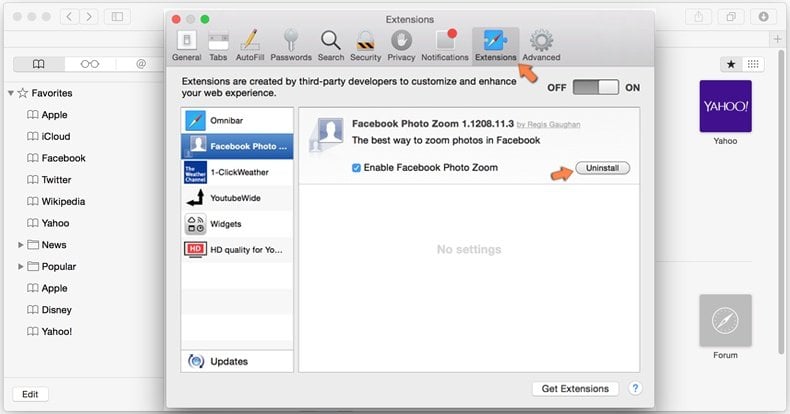
In the opened window click Extensions, locate any recently installed suspicious extension, select it and click Uninstall.
Optional method:
Make sure your Safari browser is active and click on Safari menu. From the drop down menu select Clear History and Website Data...
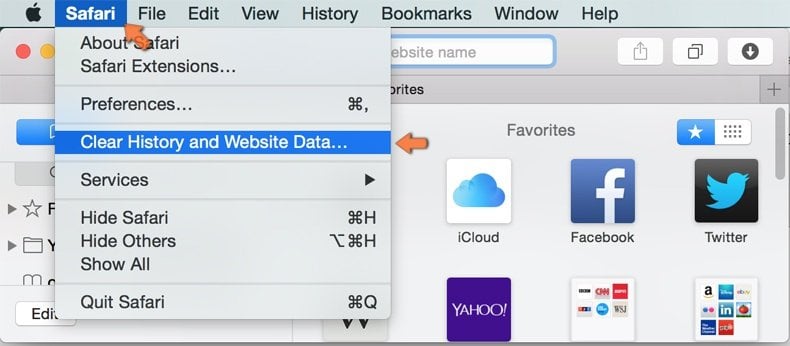
In the opened window select all history and click the Clear History button.
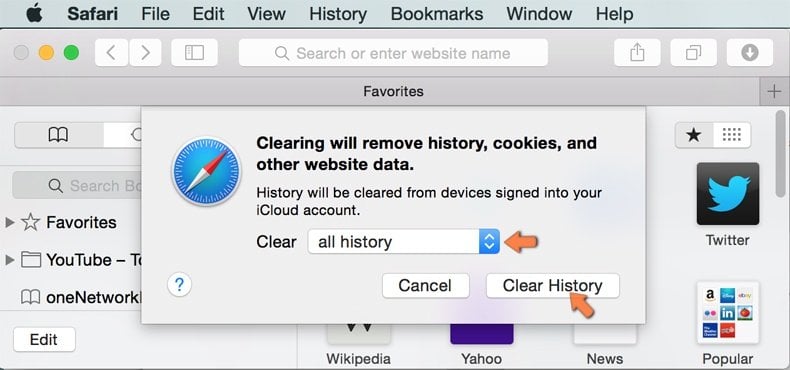
 Remove malicious extensions from Microsoft Edge:
Remove malicious extensions from Microsoft Edge:
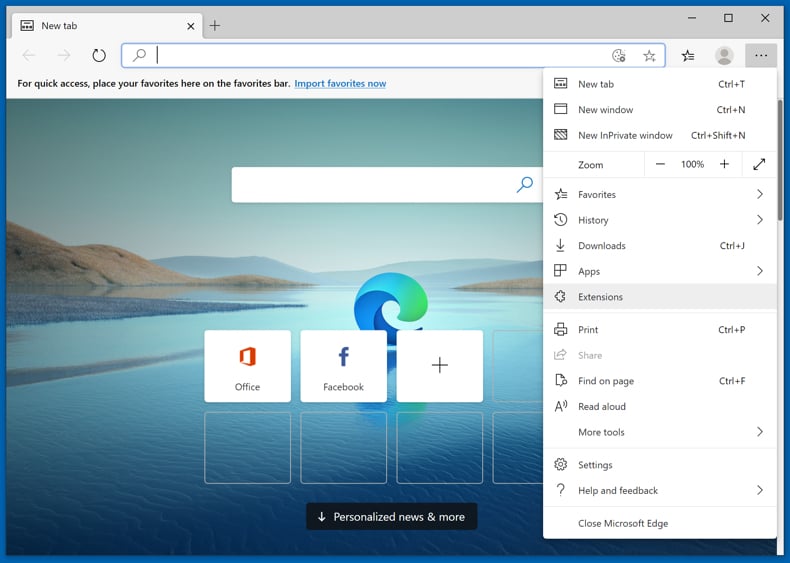
Click the Edge menu icon ![]() (at the upper-right corner of Microsoft Edge), select "Extensions". Locate all recently-installed suspicious browser add-ons and click "Remove" below their names.
(at the upper-right corner of Microsoft Edge), select "Extensions". Locate all recently-installed suspicious browser add-ons and click "Remove" below their names.
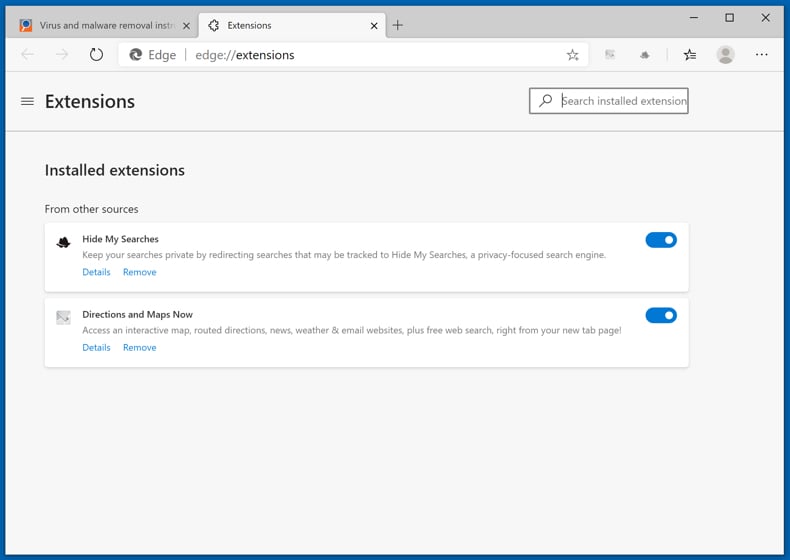
Optional method:
If you continue to have problems with removal of the autoclicker questionable application, reset your Microsoft Edge browser settings. Click the Edge menu icon ![]() (at the top right corner of Microsoft Edge) and select Settings.
(at the top right corner of Microsoft Edge) and select Settings.
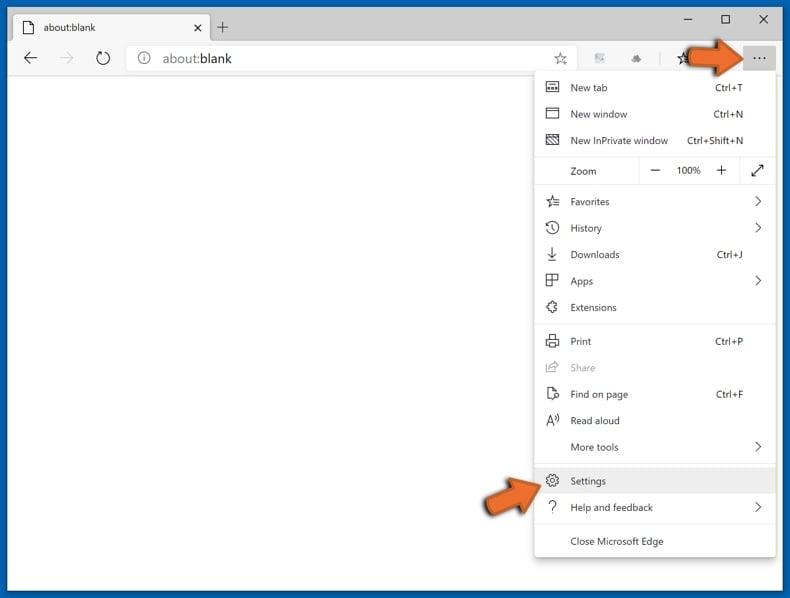
In the opened settings menu select Reset settings.
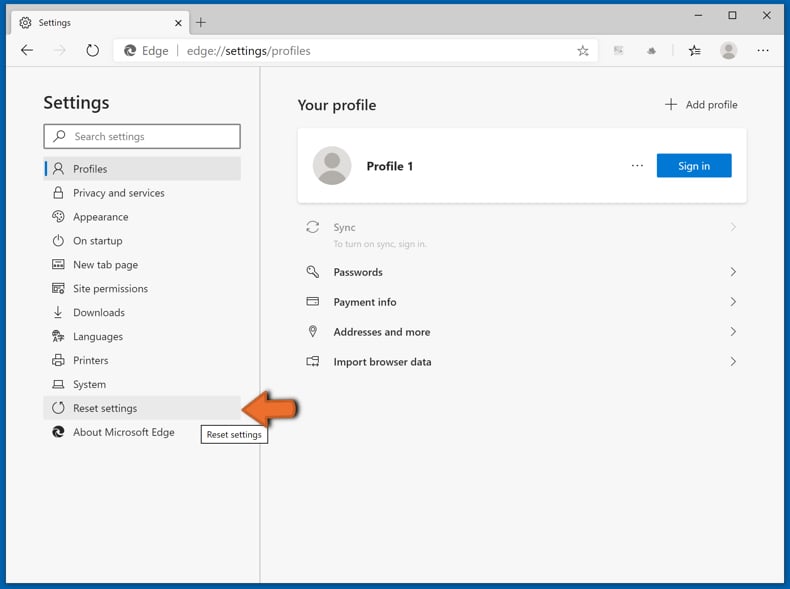
Select Restore settings to their default values. In the opened window, confirm that you wish to reset Microsoft Edge settings to default by clicking the Reset button.
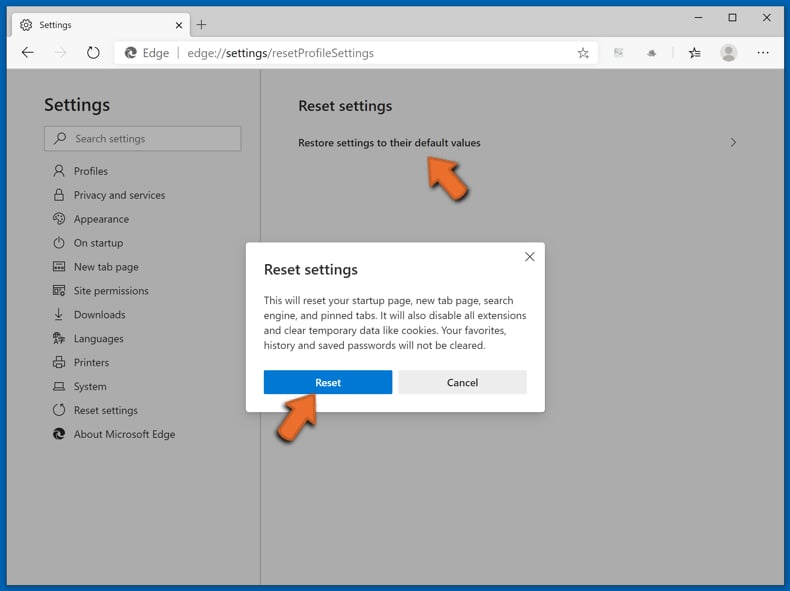
- If this did not help, follow these alternative instructions explaining how to reset the Microsoft Edge browser.
Summary:
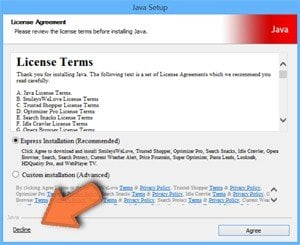 Commonly, adware or potentially unwanted applications infiltrate Internet browsers through free software downloads. Note that the safest source for downloading free software is via developers' websites only. To avoid installation of adware, be very attentive when downloading and installing free software. When installing previously-downloaded free programs, choose the custom or advanced installation options – this step will reveal any potentially unwanted applications listed for installation together with your chosen free program.
Commonly, adware or potentially unwanted applications infiltrate Internet browsers through free software downloads. Note that the safest source for downloading free software is via developers' websites only. To avoid installation of adware, be very attentive when downloading and installing free software. When installing previously-downloaded free programs, choose the custom or advanced installation options – this step will reveal any potentially unwanted applications listed for installation together with your chosen free program.
Post a comment:
If you have additional information on autoclicker questionable application or it's removal please share your knowledge in the comments section below.
Frequently Asked Questions (FAQ)
What is the purpose of an unwanted application?
The purpose of an unwanted application is typically to perform actions such as displaying intrusive ads, tracking user behavior, hijacking browsers, or tricking users into paying for fake or unnecessary services.
Is AutoClicker unwanted application legal?
Unwanted applications are often considered legal because their End User License Agreements (EULA) usually disclose the potential behaviors of the app, making users aware of its actions, even if those actions are undesirable.
Is having AutoClicker installed on my computer dangerous?
This app and its installer are flagged as malicious by multiple security vendors. Also, AutoClicker is distributed using shady channels. Thus, installing it may expose users to privacy and security risks.
Will Combo Cleaner help me remove AutoClicker unwanted application?
Yes, Combo Cleaner will scan your computer and remove all malicious and unwanted applications. Keep in mind that manual removal may not be successful, as some leftover files or components might remain hidden in the system. Thus, it is advisable to use specialized tools for removal.
Share:

Tomas Meskauskas
Expert security researcher, professional malware analyst
I am passionate about computer security and technology. I have an experience of over 10 years working in various companies related to computer technical issue solving and Internet security. I have been working as an author and editor for pcrisk.com since 2010. Follow me on Twitter and LinkedIn to stay informed about the latest online security threats.
PCrisk security portal is brought by a company RCS LT.
Joined forces of security researchers help educate computer users about the latest online security threats. More information about the company RCS LT.
Our malware removal guides are free. However, if you want to support us you can send us a donation.
DonatePCrisk security portal is brought by a company RCS LT.
Joined forces of security researchers help educate computer users about the latest online security threats. More information about the company RCS LT.
Our malware removal guides are free. However, if you want to support us you can send us a donation.
Donate
▼ Show Discussion